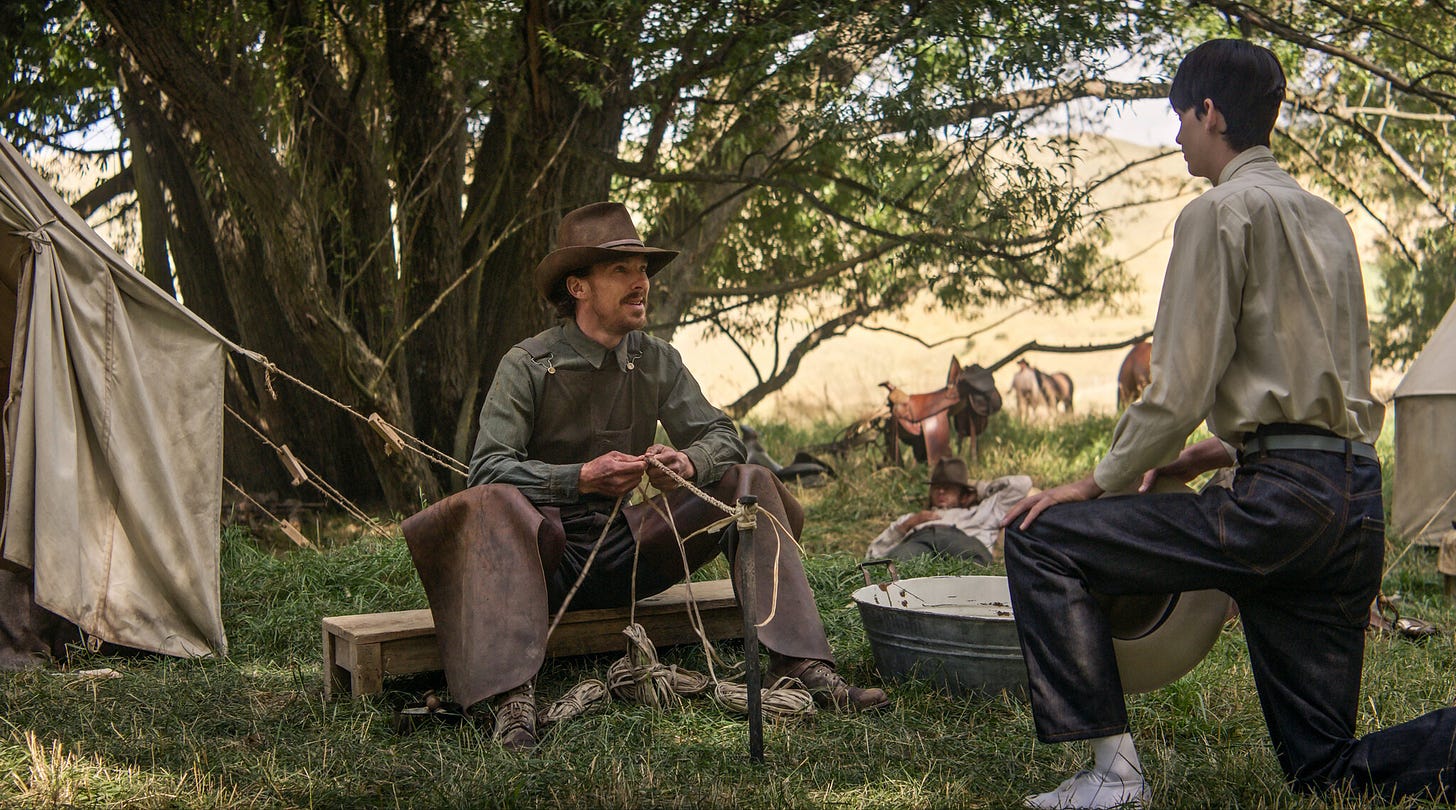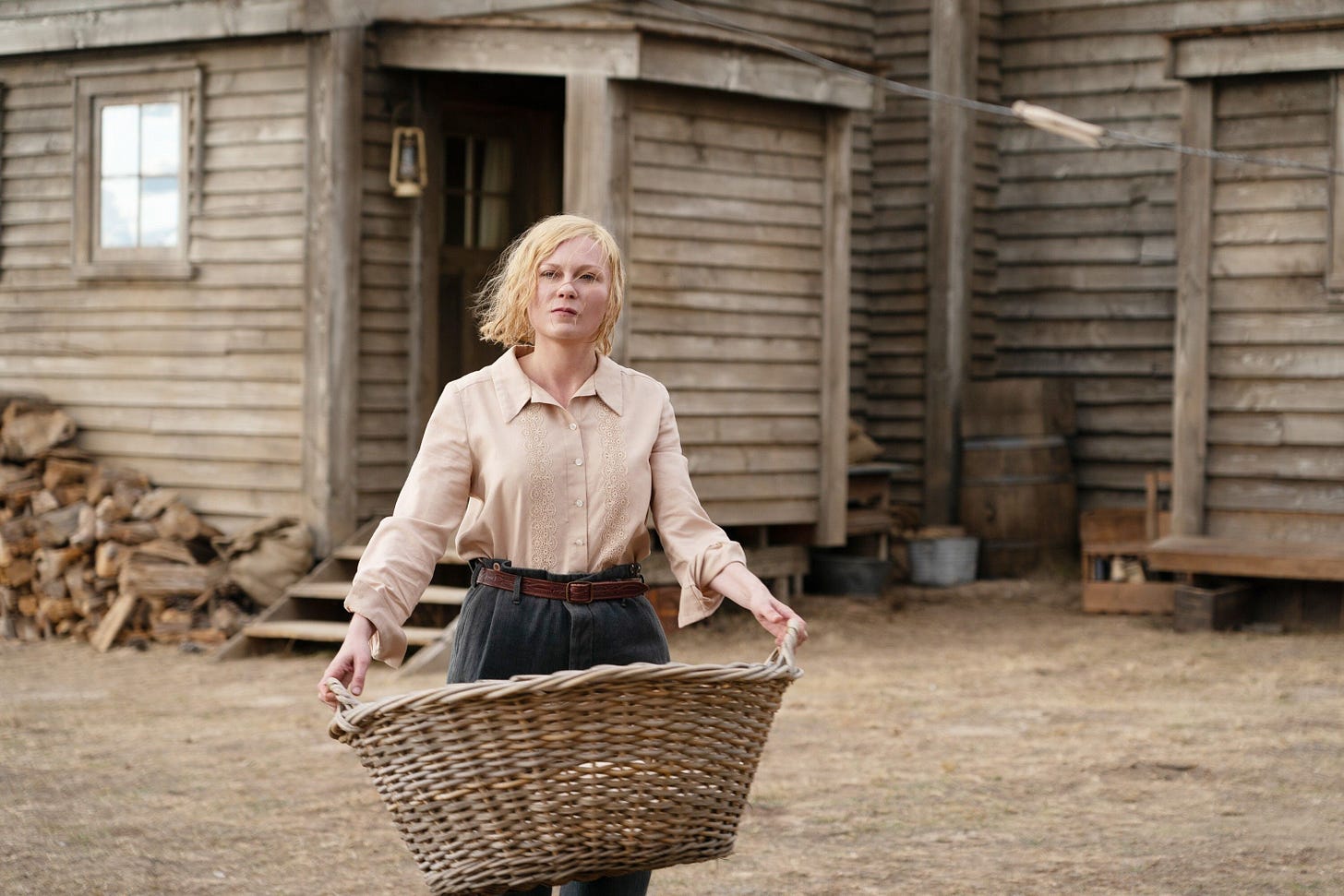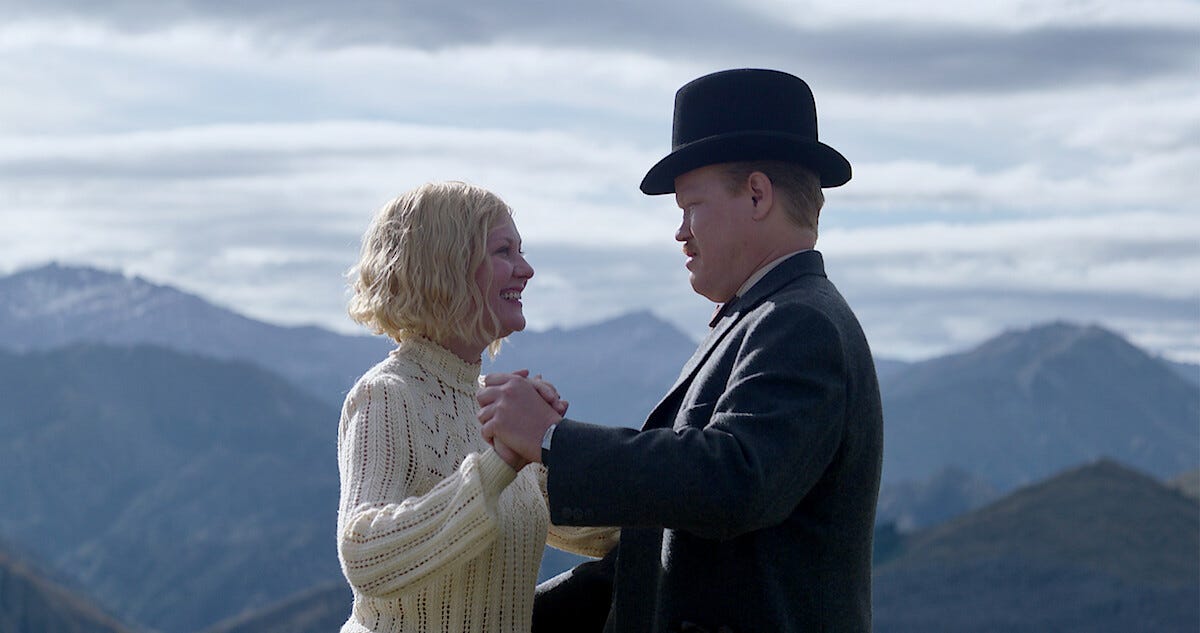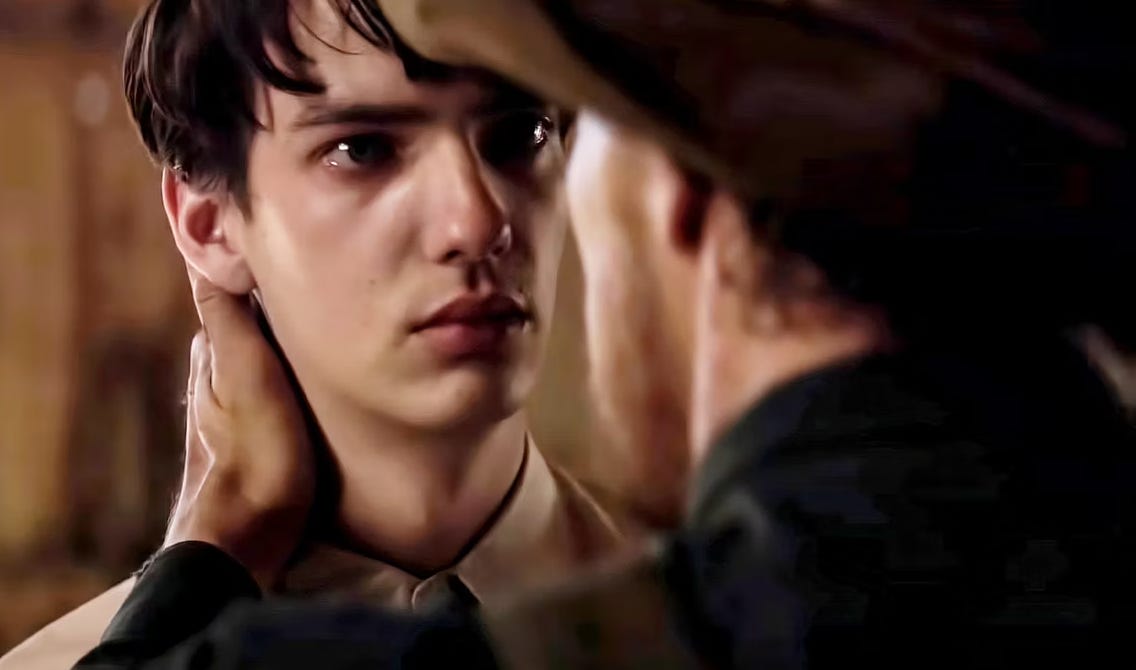The Villain in Power of the Dog Isn’t Who You Think It Is
Toxic masculinity for all.
Jane Campion’s The Power of the Dog virtually begs you to question whether the movie’s villain is actually the movie’s villain. Not many critics have done so, though. That’s unfortunate, because the film is much more interesting when you realize that toxic masculinity is a hat that isn’t just worn by cowboys—and for that matter, isn’t just worn by men.
For most reviewers, though the cowboy and the toxic masculinity have seemed like a natural fit. The black hat that says “bad guy” in The Power of the Dog is perched atop the sneering visage of swaggering, bullying rugged dude Phil (Benedict Cumberbatch).
Phil and his quieter, cleaner brother George (Jesse Plemmons) are wealthy Montana ranchers who often sleep in the same room—until George falls for innkeeper Rose (Kirsten Dunst). Phil is angry and jealous, and bullies Rose, just as he’s always casually bullied “fatso” George. Phil also targets Rose’s skinny, nerdy son Peter (Kodi Smit-McPhee), calling him a “Nancy boy” and other homophobic slurs.
Rose becomes an alcoholic and her relationship with Phil goes from bad to worse. But Phil grows to like Peter after the boy returns from medical school on break. Phil starts to teach Peter to ride and ranch, and Peter seems to return his affection. But when Peter sees his chance, he passes Phil anthrax-infected rawhide. Phil, who has cut his hand, works the rawhide to finish a rope for Peter. He becomes infected and dies horribly.
Rose appears to have put aside the bottle when she comes to Phil’s funeral. Peter seems to believe he has saved her from Phil’s ugly manipulations, and most critics have more or less cosigned the boy’s perspective. Monica Castillo at Ebertvoices, for example, writes that “Phil extends Rose no kindness, slyly creating a toxic environment that poisons her, in order to retain power over his brother, their business and who is in charge around their stately mansion. She’s like an existential threat to him: she represents the sex he doesn’t desire and someone he doesn’t yet have under control.”
Complicating but not altering this dynamic is the fact that Phil is gay. Over the course of the film we (and Peter) learn that Phil has a stash of body-building/gay porn magazines. Phil also had a very close relationship with his cowboy mentor, Bronco Henry. In one scene we see Phil masturbating with Henry’s handkerchief.
Phil’s homophobic attacks on Peter, then, can be read as projection and deflection. As a gay closeted man, he embraces a hyperbolic and aggressive masculinity—refusing to wash, refusing to wear gloves, idolizing toughness and insulting effeminacy—in order to prove to himself and others that he is a true manly man. “If masculinity is a prison, then Phil is trapped until the day he dies, George manages to escape, and Peter was always free,” Anna Menta writes at the Decider. What traps Phil, in this reading, is his sexuality and his fear of revealing it. He’s still the villain, but he’s a villain driven by loneliness and pain. You understand him and care for him, even though you know he must be defeated.
Again, that’s been the mainstream critical take on the film. But what if we look at the movie from another angle? Maybe Phil isn’t the bad guy. Maybe the bad guy is the person who commits an unprovoked, deliberate, Machiavellian murder.
There’s no question that Phil is an asshole. He thinks Rose is after George’s money and tells her so. He ridicules her mediocre piano playing. He bullies her son. He’s an extremely unpleasant in-law.
But usually, in the normal course of things, we don’t tend to consign extremely unpleasant in-laws to death. And it’s hard to argue that Phil has done anything that remotely justifies what Peter does to him.
Peter seems to blame Rose’s alcoholism on Phil’s mistreatment. The movie traces the start of her drinking to the moment when her piano performance for the governor and George’s parents goes poorly. And it’s true that Phil (an expert banjo player) is aware before the party that Rose can’t play very well, and that he mocks her for it.
But it isn’t Phil who forces her to sit down at the keyboard. It’s George. Rose tells her husband repeatedly that she doesn’t want to play in public. He refuses to listen to her or to believe her. He wants her to be an ornament advancing his social position. And she has to comply in part because she and her child are dependent on that social position and on his money.
Rose is ground up in toxic masculinity. But the toxic masculinity in question isn’t Phil’s open bullying. It’s George’s gentle but inexorable determination to make her who he wants to make her, with or without her consent. He publicly humiliates her, and it’s her, not him, who has to live with the shame. That’s how patriarchy works.
George, then, with his wealth and power and cluelessly cruel assurance, has adamantly not escaped from masculinity. Nor has Peter always been free of it. On the contrary, the main enforcer of toxic masculinity in the film is arguably not Phil at all, but the man who kills him.
In one conversation between Peter and Phil, Peter explains that his father worried about him not because he was too weak, but because he was too strong. Peter’s father feared that his son lacked kindness. Phil laughs, because Peter is skinny and pale and seems far from the rugged individual cowboy ideal.
But the joke is on Phil. Yes, Peter makes paper flowers and walks with a mincing step. But he’s also capable of a deliberate, methodical bloodthirstiness. He catches rabbits to dissect them and has no qualms about snapping their necks with his hands. More, Peter has traditional masculine ideas about protecting women, especially his mother.
He also may have traditional ideas about enforcing masculine conformity. Peter’s own sexuality is uncertain. But he knows Phil is gay. When Phil says Bronco Henry kept him warm by crawling into his bedroll, Peter asks if they were both naked at the time. He may be exploring the possibility of homosexuality for himself. He may be subtly denigrating Phil. He may be doing both.
Rose’s animosity towards Phil, which inspires Peter’s, may also be in part homophobic. Phil never tells anyone about his sexual relationship with his mentor, and no one talks about it. But George is uncomfortable toasting Bronco Henry. That may be because he knows Henry was gay.
Similarly, Rose’s violent reaction when Phil starts to treat Peter with kindness seems out-of-proportion and counterintuitive. She’s disliked Phil because he bullied Peter; now he’s treating Peter better. That seems like it should be a good thing. Unless she knows Phil is gay, and, in line with homophobic stereotypes, worries that her child is unsafe with him.
Peter may be sexually attracted to Phil. They share what seems like an almost-embrace at one point. And after Phil’s death, Peter keeps the infected rope the cowboy made for him. It’s a symbol of toxic masculinity. But whose symbol? Is Phil the cold-eyed poisonous cowboy, embracing violence and cruelty to hide his gender nonconforming sexuality? Or is that Peter? It’s Peter, after all, who, per gay panic, asserts his own masculinity by murdering a homosexual man who expresses affection for him.
“The power of the dog” of the title is the power of the cowboy myth and its linkage of masculinity, stoicism, and violence. At the end of the film, when Peter reads the Bible verse, “Deliver my soul from the sword; my darling from the power of the dog,” he may be doing so in triumph. He has delivered Rose, his darling, from Phil and the specter of toxic masculinity. But another possibility is that Peter is the “darling” in question, and that he is praying, in vain, to be delivered from his own capacity for violence and cruelty. His soul still grips the sword, or, in this case, the anthrax.
Campion doesn’t offer one right answer or solution. You’re supposed to sympathize with Peter and Phil and Rose and George. Each of them is a victim of patriarchal policing and patriarchal violence, and each of them perpetuates it, passing that diseased rope around like a noose. The power of the dog sinks its teeth into all of them. But if you’re looking for villains, it seems significant that, in this story at least, the heterosexual family perpetuates itself by murdering the one character we know is gay.






It’s been awhile since I watched this movie, but my recollection is that Peter is most definitely “the villain.” He kills Phil and it’s also implied that he kills his father. I thought he was a sociopath.
The secondary villain to me was homophobia/being closeted. I sympathized with Phil who ends up being murdered by showing kindness (and/or attraction) to Peter. It reminds me a bit of American Beauty in that way.
I didn’t think of George as expressing toxic masculinity. I thought of him as clueless and ineffective. He doesn’t know Rose isn’t very good. He’s in love with her and thinks she’s great. I didn’t get the sense he was trying to remake her, so much as he expected everyone to see her how he sees her.
Probably a good time for a rewatch.
I can't stand watching movies that depict this kind of cruelty, but as a longtime contrarian text-analyzer, I appreciate your deep dive into these characters' motivations and subtleties - much better than a traditional movie review!